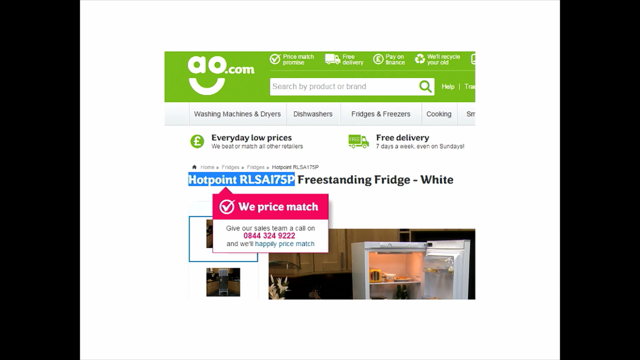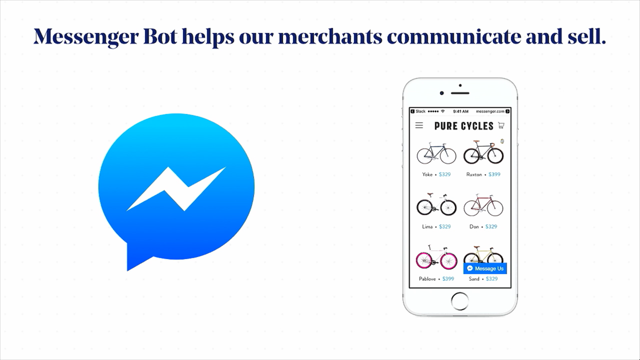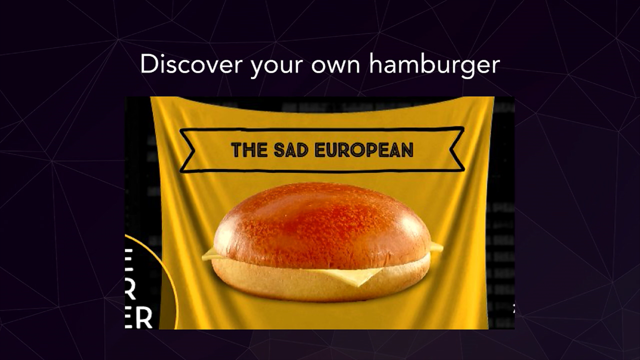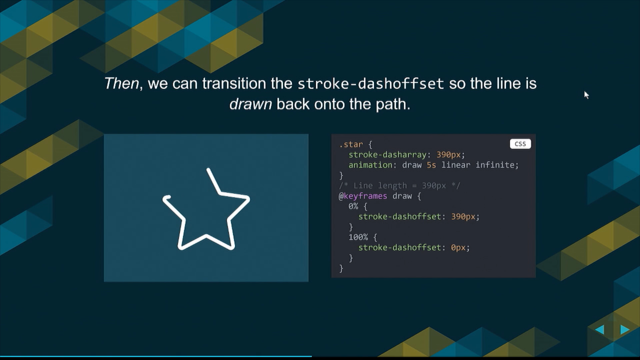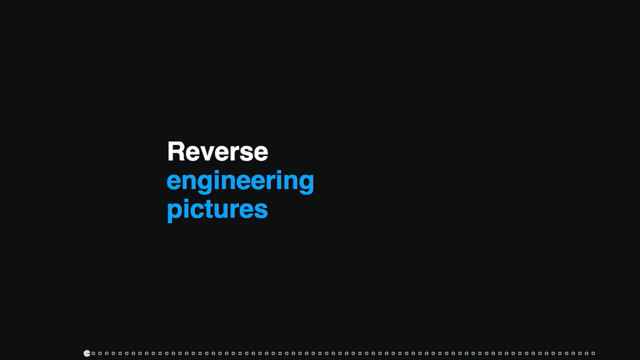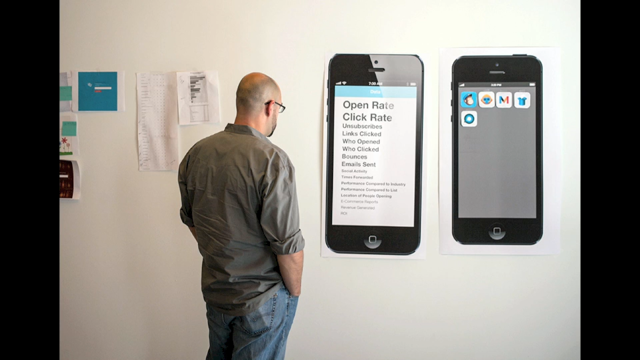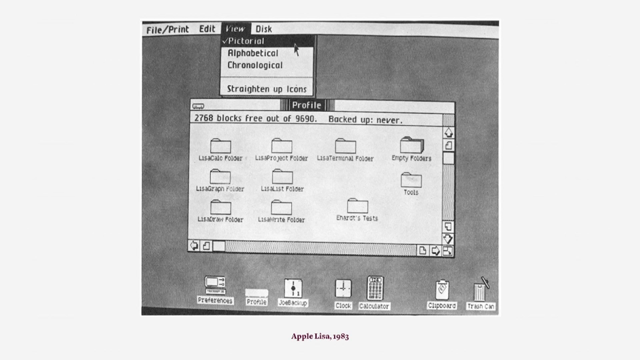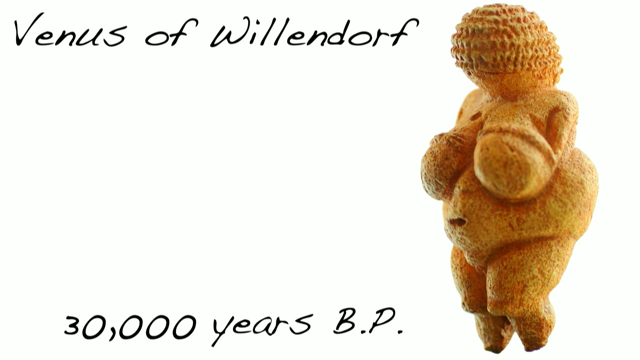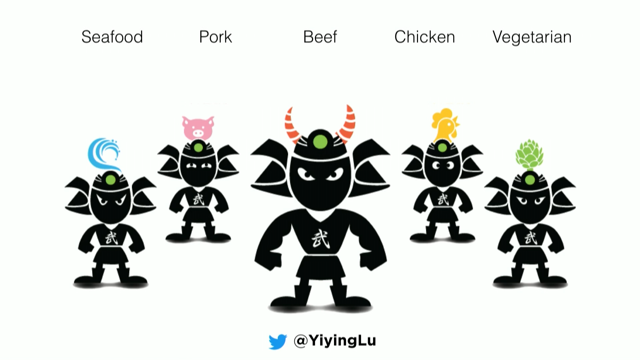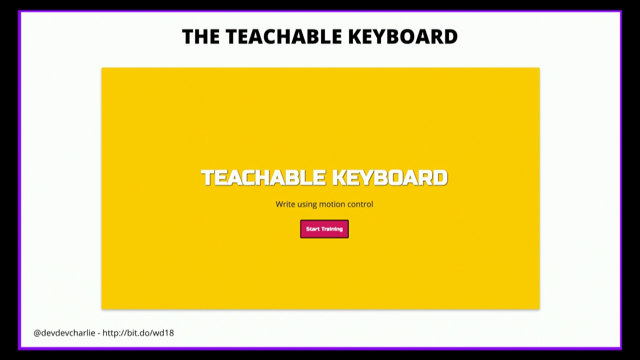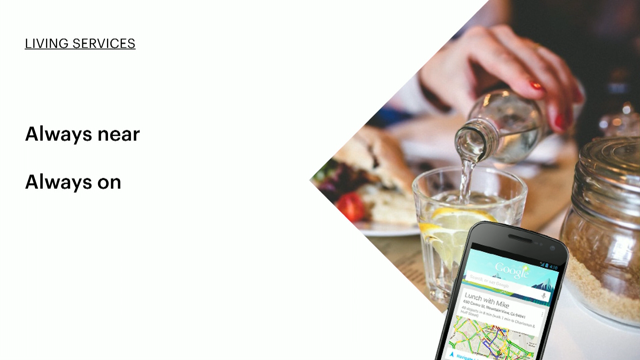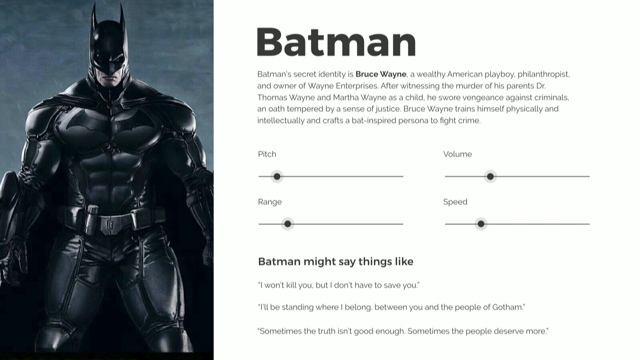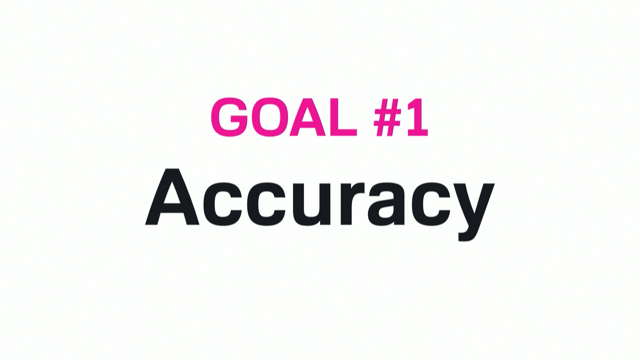Philosophy, Ethics and Design

(funky music) - Good morning.
I try to softly tell him that it's not Austria but Switzerland before.
(audience laughing) But yeah, the accent is very similar apparently. (audience laughing) I'm gonna talk about Forming Thoughts and Actions. And usually I try to not show slides and just speak it out like the old masters did.
It actually works.
But I had a lot of fun doing this.
I made a special font for this presentation because it's about connecting the dots between design and philosophy.
So there are bits with dots where I suggest yeah, there's connection there; and there are bits without dots where I, yeah, let's not overdo it.
But there are these two fonts.
So what is this about? It's about ethics as a trend.
It's about ethics as a bridge between design and philosophy. It's about design as a form of shaping action. And it's about philosophy as a discipline that forms thought.
And I tried to connect the dots throughout the presentation but then again, of course in the end, just quickly why would I talk about this in public? (audience laughing) I studied philosophy.
I studied quite early because I wanted to impress a girl when I was 16.
I thought that's the kind of thing that works with girls. It's a very stupid idea.
(audience laughing) So it didn't work on the girl.
But I found a good ersatz in philosophy.
And I got quite obsessed with it for sometime. And then I got tired, because when you go and study philosophy, it's really boring, it's very painful and very boring. There are people that play cello and things, very exciting, and they listen to strange music and old music, dusty music. And when you say yeah, you wanna impress them so like yeah, I listen to Tom Waits.
They're like (blows raspberry) Tom Waits.
But I still love it a lot.
And unlike some of my study buddies back in the day, when I say I'm still reading Hegel and Wittgenstein and Heideker, they're like (groans) I couldn't do that, that's just so boring.
So happy I don't have to do that anymore.
But I still kept to it, then I started to design. He said that as well.
So there are these two souls inside me.
And as I'm slowly getting out of client work, I have more time and I'm trying to connect these two things that I really like.
And I think there's a lot to connect.
So as you have definitely noticed, there's sort of a trend this year, ethics, started by this company more or less, Kickstarted almost. Mark Zuckerberg said a lot of stupid things, did a lot of stupid things.
I'm not gonna read from the slides all the time, there's so much words.
These are very stupid words, right? In a time where Facebook is shaking with privacy scandals, they say like you know what, let's launch like an Alexa thing to spy on people. This is just a good time right now.
So people, among others, because of Facebook and Google, et cetera, like yeah, maybe we need something like, I heard there's something called ethics and it's about how to be good.
Maybe that's missing.
Mostly what you hear is like moral things, like you shouldn't do this, you shouldn't do that. That's not really ethics, but we'll get to that later. Another company, a bit smarter, that got started on the idea that computers should serve people and not the other way around, that's the original mission statement from Apple very early on and then invented the iPhone and then launched the iPad and then watched that enslaved us.
They still lately seem to get it right.
So Tim Cook said that Apple believes that privacy is a fundamental human right.
That's a very solid belief because the UN Universal Declaration of Human Rights, Article 12, states, no one shall be subjected to arbitrary interference with his privacy, family, home or correspondence; nor to attack upon this honour and reputation. Everyone has the right to protection of the law against such interference or attacks.
So the UN believes that too, right? Not just Apple.
But yeah, there are good (mumbles) the CEO says something that simple and that short. Compare that to Salesforce, which is actually the biggest employer in California. I haven't checked that, but I've read it a couple of times. So I thought Apple is the biggest employer, but Salesforce. Who uses Salesforce? Do people use Salesforce? Yeah, yeah, people do use Salesforce.
I never see that, but apparently it's really important. (audience laughing) Yeah.
He's not that excited about philosophy, but I had to cut out a lot of stuff.
But it's much longer.
Like I said, I don't wanna read it, I don't wanna read slides so long.
But you see, for him he's like yeah, I think it's eh, (mumbles) if it's structured, the conversation, then we can talk about it.
If it's not structured, then yeah, maybe not. Let's make a structured conversation about ethics. I don't wanna say things that later I have to follow up. And what really got me worried about a month ago is when the inventor of the Hype Cycle said that ethics is now a big trend for 2019. It's number nine, so it's not like the biggest trend. But maybe if we wait another year, ethics will be the new Blockchain.
A new AI, AR, Internet of Things, 3D printing, gamification, whatever it was that would change the world and get us more in trouble in the end.
The nice thing about ethics though is I studied that for quite some time and I never thought that someone could make money with this.
(audience laughing) But it looks like soon, these guys are gonna change their tune.
I don't know if you noticed that, but I have a bookkeeper, very good guy.
He looks at my books at the end of the year and says like hey, here, you went to a restaurant in Sydney and there's no receipt.
He just looks at all these numbers like that scene in The Matrix where they see like, he's like that, he's really good with numbers that bookkeeper, fantastic guy.
But if he told me, you know what, we're gonna start doing design.
I'll be like nah, nah, that's a bad idea.
But somehow all these business consultants with like batsuits, no taste and ugly pyramids in the presentation and then the bookkeepers, and not just any bookkeepers, big bookkeepers, they're all in design now.
And Deloitte now, they have all these signs at the airport say, I show that there's some Deloitte people here and I know you're different, but... (audience laughing) That airport's saying, would you do design? And they already have probably patents for Blockchain and stuff.
They're really fast with the trends, and they look really good and have people and tables at the office and it's a very hip thing to be a designer. But I'm sure that they're gonna change the pitch and they're gonna advertise at airports again that they can see into the future, where they will see Apple.
And then they're gonna explain to other big companies that if they don't do ethics now, they're only gonna have a reach small share of the market. So things have to be turned around.
People have to be fired.
(audience chuckling) They're really good at that.
And then some magic will happen.
It will be almost automatic.
Rowing boats will turn into speed boats, and speed boats will turn into cruisers.
The revenue will go up, and everything will be super, super amazing.
This is kind of like a symbol for money these days. So unicorn.
Of course gonna cost some money, a lot of money. But it's going to change nothing because it's all lies. They're gonna pretend to know about ethics. They're gonna pretend to care about ethics like they pretend to know about design and pretend to care about design.
I disagree with one point that we heard yesterday, is like design is having made it.
When big bookkeepers and banks and so on buy design (mumbles) is a very bad sign.
It means that there's no business so they can be successful by themselves.
So since we're so wonderfully sarcastic and kind of moral, what is the difference between moral and ethics anyway? So that's one of the books that came out on ethics this year, very well written.
And it had this question in there that bothered me a lot because it goes on, because then it goes on saying like yeah, it's pretty much the same thing, morals, ethics, also philosophers use it exchangeably.
And that's not fair.
It's not fair, morals and ethics are not the same thing, really not, they're very different. We hear a lot of moral people saying this is bad, you should do this, you should do the other thing. That's morals, and ethics is different.
And how? Well, in all fairness, if you look at the root of these words, and that's often something we do when people ask us what is the difference between two words, can you explain a word (mumbles) like if we're familiar with that trick, we go to Wikipedia or to an etymology site, look at the root and then we feel that when we know the origin of the word then we know the real meaning, right? Which is of course nonsense.
But the origin is mores, Latin mores, and has nothing to do with Philip Morris, or not much. (audience laughing) It is a lot about what we're use to, what is allowed, what is not allowed, what is custom, norm, tradition, practise, a way of living? You see I've been to Wikipedia myself here. It describes a way of doing things.
And ethics comes from old Greek ethos, and it's the same thing, right? It's custom, norm, tradition, practise, way of living, the way of doing things.
And it also means character.
So there's this small difference in the word. And it is true that ethics is also called moral philosophy or practical philosophy.
So you could say yeah dude, or as you say here, mate.
And yeah, what is the difference between dude and mate anyways? (audience laughing) The dude is up here.
And the mate is down here.
(audience laughing) Right? There's a mate here, a little mate in England sometimes, but mainly you own that word now.
And it has a similar meaning as far as I can tell. There was a gentleman on the plane with like, I think he wore boxer shorts and the teacher said something like, no one thinks here or something like that.
And he just said mate all the time, like when he wanted to go to the bathroom or just for fun. He looked outside the window, he says mate, you know. So yeah, you own that word.
But as far as I can tell, it's a similar meaning. Americans would look out the window, say like dude, you know.
I don't know if they would say dude.
Yeah, maybe if they wear boxer shorts on the plane, they would maybe say dude if they want to go to the toilet. So it's different people, different context and different use.
That makes these words a little bit different, but you have to really dive into it, right? And it's the same thing for ethics and morals. Yeah, they look kind of similar.
If you want to, if you force them, you can use them interchangeably.
But if you have a bit of experience with it, you know they're used differently.
Ethics is probably something you encountered at the blackboard the first time, or something similar to a blackboard.
It's taught by specialists in a very abstract way. And morals, you hear everywhere.
At least in Switzerland, if you're not nice, people come up to you and hold moral speeches and you encounter morals everywhere.
Different context.
Ethics is something you find in university, and it tries to be universal.
And morals you encounter very early in the family and can be very local, can be very confusing at times. For instance, in Japan, it's frowned upon to be too open about things.
People are mostly very polite to a point where you get depressed because you don't know anymore who you are.
If you're western, you need some feedback sometimes. People that tell you who you are, what not to do. And in Japan, you don't do that.
But then suddenly when you get married into a Japanese family or when you have Japanese friends for a long time, you get shocked how direct they can be in balance to their politeness and everyday life. And they have words for that, (speaking in Japanese). And yeah, it's a very local phenomenon.
If you move to another country, you know that very well.
So yeah, the words ethics and morals are used differently. Ethics makes you think, and it makes you think about yourself.
And ethics asks questions.
Morals has answers.
It's directed mostly to other people, and it tells you off, right? Ethics kind of doesn't really.
I mean, ethical people can get moral and can get angry. They get very angry, and then they become moral. But ethics itself tries to stay focused and concentrated and tries to eliminate emotion from the argument. And morals are also holier than you always. There's always a lot of hypocrisy involved in that. With ethics, sort of not because...
You can actually discuss ethics at the very high level and still be an asshole.
It's completely okay, it's totally okay, it's totally okay. I mean, you shouldn't.
As an ethical person or as an ethical theorist, you know that you shouldn't.
But if you're moral to people and you're an asshole, that's a different story.
So they have a different feeling.
Morals are sort of emotional and no, no.
And ethics, they have some emotion as well, but they try to put the emotion into a system. When we think, we look inside and we try to feel and try to find shape for these feelings.
And so do philosophers, even though they forget that sometimes.
Thought comes from the body.
Understanding comes from the body.
Understanding something means feeling what someone else has felt.
So ethics is a philosophical term.
So by definition, ethics doesn't really know. I mean some would pretend they do, but that's not a really philosophical thing to say like I am absolutely 100% sure, I measured it. Ethics is a philosophical discipline.
It doesn't know, and it's kind of proud about that. It doesn't judge either.
You can move to morals and then say like you know, Facebook sucks.
You can do that, but it's not an ethical argument. And ethics doesn't really command.
It tries to make you think and find the right path, which eventually will be, depending on moral judgement . So you could say like well, if it does move anything, what is it good for? I felt this ethics is gonna save Facebook, right? No. Maybe a better question is what does ethics have to do with design.
Or even more extremely put, what does philosophy have to do with design? So this is Dieter Rams.
I stayed up until three o'clock to make that icon. It doesn't look like Dieter Rams yet, but I tried my best, has glasses.
And he's sort of a philosophical designer.
He wrote his 10 principles for good design. This is number four.
And he really underlines that when we design things, we have to have a good understanding of what we do. And there's a movie coming out, biography about him, and in the preview, I saw he says the times of thoughtless design for thoughtless consumption are over. I cannot have a strong enough German accent to say that. I'd love it to be true, but...
It's a bit old man shouting at the clouds.
(audience laughing).
Like literally.
But I share, I share his opinion that because of the trouble we're in right now technologically is that we haven't thought enough about what we do. Yeah, we measure a lot and we're like oh, there are numbers, the numbers are growing, let's keep on growing.
We don't care what it means.
We just like numbers, that's the truth, we only believe in that, and that is a big problem. Again, this is Dieter Rams.
Until here, it was all kind of pop and fun, but now it gets a bit more abstract.
So I use icons with labels so you don't get too confused. Dieter Rams shapes things.
He shapes things by putting thought into things. He thinks of stuff and makes things out of these thoughts. And to really hammer it in, this is kind of how this looks.
He puts thought into things, right? Another illustration, thought into things.
And that's how people like Dieter Rams understand design. And then what happens then? Then we use these things.
Philosophy often sounds very trivial then suddenly gets very complicated and everybody's confused.
But you know (mumbles) design thoughts into things. Then we use these things.
And if design were only shaping things, it would be easy but Dieter Rams and other design have shaped things that we use.
So actually, we shape action.
Again, I know UX, you're all familiar with that, but it's kind of good to let this sink in and illustrate what this means because with all the years I've been doing this, for almost 20 years, I always have to think about that again when I design something.
What does it mean when we use something? It means that we see an object, product, we think about it, and then we act with it, and then there's this hole on the interaction going on which is crazy.
And how does that happen? Well, through the interface, right? There's an interface somewhere.
And this is often where even designers have a hard time to explain what the interface exactly is.
Of course to a normal person, the interface of a hammer is maybe the handle, right? When I hold the hammer and then...
And when you look at the website, it's kind of the layout, the buttons, the size of the buttons and things like that. But this is one definition, people use the word interface like that and so it's a valid way to use the word.
But the professional term interface works a bit differently. And so I made another icon.
That's at one o'clock at night.
You can see that I made Plato before this, but this is Jeff Raskin, the father of the Macint.
He wrote a wonderful book called The Humane Interface that you all have to read, you have to.
It's a moral commandment.
It's a really, really good book.
And if you're too lazy, then I give you the two best quotes just right now.
Jeff Raskin who thought a lot about interfaces in a very deep, precise, careful philosophical way, he is sort of the equivalent for me of Dieter Rams on the interaction design side. He said that, the interface is how we achieve tasks with a product and how it really stands out.
The interface is not a what.
It's not the layout of the button shapes or something like that.
It's how, it's how we achieve tasks with a product. It's how, not a what.
And so where is it exactly? It's somewhere there, right? It's somewhere there on the right side.
It's not on the hammer somehow, bizarrely, because the interface is what you do and how it responds.
And if you start illustrating that, you realise how wild that is.
So how you achieve tasks with a product.
That's one axis.
What you do with how it responds is another axis. I'm not gonna pretend that what you are about to see now describes the full interface.
There are just some aspects of it.
We know that interfaces responds to a need. Users are seeking for satisfaction.
That's one axis.
And there's this whole thing that users start with an expectation, and that as designers we try to shape the perception, we try to convince users of what they're about to use.
And you can imagine with what you've seen before, there's a wild circus around here, right? So all that stuff is happening in the interface, and we are shaping that more than just the outside of the hammer.
And even more wildly, all these things are connected too. We don't just shape an action or response.
Everything is wildly connected and that's why if you're in the industry, you have such great admiration for people like Jeff Raskin or for Dieter because they think all this up, right? They think this up and they get it right.
It's really amazing.
So using a Dieter Rams Braun alarm clock, you really feel like wow, this guy has put a lot of thought into that thing, not just into the shape but in how it works and he's with me.
If you deal with a really nicely designed product, you feel connected to the designer.
You feel like oh, we share some common space in our body and minds.
And that's wonderful.
Of course there's a lot of speculation in that product. So when Dieter Rams draws out all these beautiful drawings for Vitsoe and Braun, he's always thinking about us. He thinks like yeah, what would Oliver like? What would Oliver want to do? And he tries to feel me, he tried to think about me. And we know that if that's all Dieter would do, then it would end like this; because then you will get a lot of things wrong and I'd be an asshole and I think Dieter is an asshole when I use it if that's speculation goes wrong.
Are you still following or is that not completely out there? I told you it's very trivial and now it gets crazy. But this is really happening in the interface. You have thought about that too, right? I'm not the only one I hope.
It's true, right? There's lots of stuff, it's not just shape. There's like lots of thoughts and feelings and things going on.
So because things go wrong if we only speculate, we found out in our discipline that we have to talk to each other.
That really helps, right? And then things work out better.
I don't know how much the generation of Dieter Rams would do this.
It's actually something I would like to ask him. How did you test and to how many people did you talk before you designed these beautiful shelves that work so well? I'm sure that there must have been some contact with Dieter. I'm not so sure about USM.
Have you ever tried to take apart a USM furniture? It's impossible.
It looks beautiful, but it's very, very hard to use. So here's something that philosophers could learn from us designers.
Don't just write clever books.
I'm preaching now, but...
(audience chuckling) This is nothing compared to what you can expect if you go to university studying philosophy. Nothing.
I really try to make you understand what I say, I think, right; and what I feel.
I really, really try very hard.
And there's nothing of that if you go to university studying philosophy.
It's just insane.
Philosophers are very sensitive people.
They play cello, right? (audience laughing) And they think really, really hard and it's sort of an art what they're doing. And I was impressed by the intelligence and by the sensitivity of these people.
And then when you hear what they say, you think are they stupid or am I stupid? (audience laughing) They're not.
They beat you at chess, they know everything. They're really very impressive people, but there's sort of a laziness in the design of philosophy. When they think they figured it out, they put it down on paper and then they make it a bit even nicer.
It's like these designers that put everything on a grid sometimes and they don't care if it makes sense. They figure it all out and write it on paper and then they don't care really if other people understand it.
That's really bad design, right, but you see in philosophy often.
And it's a shame because they do get a lot of things right, as we'll see later.
And they speculate a lot too.
It's true, it's true this idea of philosophy, people are thinking about pink clouds.
It's not how it works, but it's true that philosophers speculate and lie a lot.
And they don't even realise that because they never go and talk to people and try to find out if Aunt Yolanda understands the phenomenology of the spirit, right? When Hegel wrote The Phenomenology of the Spirit, he didn't ask Aunt Yolanda what she thinks because he was like yeah, I have this grid and everything is aligning really well.
This is perfect.
Here you go, you try to figure it out.
So it's really badly designed often a lot of philosophy, because yeah, it's all speculation.
And we know this type of design is really annoying. Engage in dialogue.
And funny enough, this is kind of how philosophy started. It's not (mumbles) I'm talking mostly about academic philosophy.
And if you go back to the roots, you find Socrates just doing that.
User experience design, like he would stand in Athens on the marketplace and wait for people to walk by, be like a troll. And if someone walks too fast, he would grab them by the arm and be like, hey, where are you going? I am in a hurry, I have to.
No, no, no, wait, why are you in a hurry? What's so important? What is importance? What matters in life? (audience laughing) And that he would engage people like for 20 years before they kill him, right? (audience laughing) But yeah, he figured some things out like that, that are quite impressive.
And we can learn, we can really learn.
If we just try.
You can start with Wikipedia.
Wikipedia gives you a pretty good overview. I've seen some PowerPoint presentations about The Critique of the Practical Reason. That maybe is not a good start.
Like it's full of bullshit.
But Wikipedia gives you a good start if you're interested, and then you grab yourself slowly into these works. But start easy because it's like if you wanna find out about relativity theory and then you start with like advanced math or something.
So as designers, we work with interfaces.
And through them, we premeditate.
So we try to think ahead what people are going to do with that.
And if you think about this, so we are shaping action in the future that there's a connection to ethics there somewhere, right? So what we do influences how people act in the future. So yeah, it seems we have a lot of ethical responsibility, right? Because we think about what people should do. That is crazy ethical.
So probably we can learn a lot from philosophers. And yeah as I said, I started with Plato and then made a Jeff Raskins icon.
Plato is sort of in the same tradition of a thinker that has a lot of affinity for beauty. He's not famous for that.
People say like yeah, he hated poets.
And people read The Republic and then they say, ah, Plato hates life.
Or they don't even read The Republic, they just find that in a PowerPoint presentation somewhere. But Plato was a tremendous static thinker, like tremendous. He formed things into thought, learning from Socrates for 20 years.
So he was just following the crazy guy on the marketplace. So this is Socrates trying to stop people, and then behind him there's Plato with the big beard listening how he trolls, right, and then writing everything down.
So we don't really know, when we read Plato we don't really know what is Plato and what is Socrates, and everybody has their own Socrates and everybody has their own Plato.
But what they did, these people, was putting things into thought.
And it always starts very easy at that time. And they it gets incredibly complicated and deep and exciting if you're that kind of guy. So again, things into thought.
Remember, like thought into things and now things into thought.
And I'll do the same obnoxious thing with the icons. Yeah, and with the labels.
So you see, it's like the other direction that philosophy goes.
And this I won't explain.
This is the original philosophical mind fuck. Is the world in our mind, or is the mind in the world, right? This thing.
And philosophers can go on forever about that. It gets deeper and deeper.
And then they put the mind into the world and the object into an object.
They say like the apple is in the world, and they can really go on for a long time about these seemingly trivial things and then they get complicated and annoying. Subject and object, right? Yeah, okay, so I'm the subject, this glass of water is an object.
But when I talk to another person, is this person object for me? Or is it another subject? How does that work? They spend all the time thinking about these things, it's crazy.
And what did Plato find thinking about, trying to put things into his mind? So he found ideas, right? Ideas are something that we're familiar with as well. The word ethos also still exists in a very similar way. But when you go back to the original meaning of idea, and a lot of designers would probably know that already, idea used to mean form.
So if you think about an old Greek person, Plato and before him Socrates running around on the marketplace catching people and they would start talking about ideas, the word eidos would mean that the time form, right? It wouldn't mean like this cloud above with the vision and like thoughts and stuff like that.
It would mean form.
So ideas are shapes.
(audience chuckling) Right? It's bananas.
And there are three big ideas apparently according to Plato. And one is goodness.
So there's not an ideal of a banana in all fairness. Ideas are sort of like sublime.
There are only ideas of like sublime things. And bananas, maybe if you really love bananas, there's like an ideal banana.
The main ideas that he found thinking for 20 years with Socrates, and then for another 20 years with Aristotle who was his pupil, they were really thinking hard and talking to each other, it was like, there is goodness...
Not Facebook probably (mumbles).
There is beauty.
Another big idea, goodness and beauty.
We sort of know that they're somehow connected too, right? And there's justice.
And like this, justice, even.
And these ideas somehow, I told you it's bananas, right? They're the same.
So what is good is also beautiful.
They even had a word for that, it's called (speaking in foreign language). It's the way of life where you say I just do what is beautiful and then it will be good. I do what is good and then it will be beautiful. But Plato was convinced.
And I told you, like he's sort of like this aesthetic thinker, right? For him, what is good is also beautiful.
When we look at the design and we think it's beautiful, there is this element of yeah, this is good but in a deeper way.
It shapes good action.
Like as we know now, there's something more than just aesthetic pleasure in a really good design. So beautiful is good, it goes both way.
And justice is beautiful too.
Like these days, when you hear things like yeah, to really get justice you need to be a billionaire, not a millionaire, like Peter Thiel says.
That really, really is not beautiful, right? That's really disgusting.
But the idea of justice, you can imagine, it's a beautiful idea.
And simple math.
So beauty and justice and being good for Plato was one. So you see, it's an eminent, Plato is an eminent aesthetic thinker.
And for him, this was all one.
So for him, you could almost say like there's a connection between ethics and aesthetics already.
So a lot of stuff happened between Plato and Kant, and I'm not gonna explain everything that happened in between because Kant alone...
We'll catch up with a lot of that stuff.
No, it's not fair to say like he, no, it's not fair what I was about to say.
It's not fair, that's not fair and it wouldn't be beautiful to say that.
So let's just focus on Kant.
I took these two thinkers because I think they really have something to add to that discussion between design and ethics.
And with Kant again, he formed thought into structured thought.
He sort of wanted to be the Newton of philosophy. This was his motivation.
He's like, if Newton found out how the world works physically, I'll do that with philosophy. And the Critique of the Pure Reason was about 150 years ahead of quantum physics and modern psychology, claiming that we only perceive what we put into things.
Really amazing work.
Very hard to read.
There's no design there.
Also he had this idea that he was about to turn crazy so he quickly had to write all these critiques. Before that apparently he was some kind of a party lion. It's hard to imagine, but apparently Kant was this kind of like (speaking in foreign language) and was hanging out at parties all the time and suddenly had this fixed idea, he was turning crazy so we had to write all these critiques in a very sloppy way by the way.
It's very sloppily written.
It's like lots of words and ah, no design.
But still, in its imperfection, wonderful and completely mind-blowing work. And because he saw that's not enough to redefine theoretical thought, he also thought about ethics and he did a similar thing there.
He defined a rule that is more golden than the golden rule. The golden rule is, and often Kant's Critique of the Practical Reasons portray it like that, don't do upon others what you don't wish to be done upon you, and yeah, there's some of that in his categorical imperative.
But yeah, this will sound a lot like me playing cello now, but act only accordingly to that maxim whereby you can at the same time will that it should become a universal law. No one understands that, right? It's different from the golden rule in as far as he says, no, no, yeah, if you follow don't do upon others what you don't wish upon you, basically you're in the right spot.
But if you want to be ethical, you have to imagine that there's a principle behind your action.
There's something that moves you to do what you're about to do.
And if that principle is so universal, applies to everyone that it can be common law, then you act ethically.
That's the idea.
And so the big step is that he was not like, because act, do upon others how you like to be acted upon, if you have an asshole then he's like yeah, whatever.
I punch you in the face, punch me back, right? That doesn't work.
But if he thinks if you use Kant's rule and you have the asshole that wants to punch people in the face, then you ask me what if punching people in the face just because you feel like it became universal law? Is that possible? Well, the asshole would say yes.
But if you have a rational person, you'd be like no, that's a bad, bad idea.
Punching people in the face like that can't be a law. What about the guy that goes to eat, have a hamburger at McDonald's? Well, let's forget about vegetarianism and all the issues there for a second, and you could say like what if everyone went to the McDonald's? It would be a disaster, right? So that's another golden rule.
What if everyone did that? Well, Kant says that's not the rule.
Everyone goes to McDonald's.
The rule behind this action to go to McDonald's is what if you're hungry and you pick a restaurant of your liking, could that be a universal law? It'd be a kind of superfluous law, but yeah it's possible.
So you see, there's a difference between these golden rules which are more in the moral territory, and ethics.
But what he found, this is just sort of like the theoretical conclusion of all this, but what he found is really mind-blowing. So he found that if you want to act ethically, it's not question of your heart.
It's not a question of you being a good person if you feel like helping a poor blind person over the street.
That's not how ethics works.
In contrary, if you follow your heart you might fall into a trap and do really evil things. A Nazi probably follows his heart, right? Of course a lot of bad things happen when people follow their heart.
So he says to do what's right, we have to follow what we know.
We have to switch off our heart.
And worse, he says that in order to be free, we need to first guarantee that there is peace that allows freedom.
And peace is not...
Freedom is not based on doing what you like. That's like a very American idea that like, yeah, I'm free when I can shoot a gun.
Then I'm free.
That's one way to use the word.
Very limited way to use the word freedom.
Without law, there is no freedom.
This will be very hard to explain to people in the White House these days.
But we have to accept certain duties to get along. And it's not our duty to have fun.
According to Kant, it's our duty.
And that's what's really surprising because when you think about Germans and duty, it's like oh my God, no, there's some Prussian shit going on and I have to do all these things, all these tasks and oh no.
But in this Kantian way, it is our duty to try to make everybody, to increase freedom to make people free.
That's our duty as well.
So this like very annoying side to duty, oh there's a blind person, you have to help them over the street.
(groans) Oh no, I wanted to go to McDonald's and I have to help this blind person over the street. Maybe it's probably their fault they're blind anyway. I don't feel like helping the blind person today. But according to Kant, it doesn't matter what you feel. The blind person you see, you help them over the street. You know you have to do that, right? And if you look at your heart, you might get confused. Like yeah, come on, let's go to McDonald's, someone else can do that.
But according to Kant, no, it's my duty and you help them over the street.
And while you do this, you've experienced that something magical happens, right? Something crazy happens.
You don't feel that annoyed anymore.
It's like before cleaning your apartment.
Before cleaning, you're like (groans) oh it's a mess, oh no.
I have to clean the apartment.
When you do it, at least for me, maybe I'm crazy, it's a lot of fun.
And when you're done, it's like yeah, I cleaned the apartment.
In a much bigger way, when through action we increase freedom, it's almost a religious experience. Action, we know, needs freedom.
And freedom needs duty.
It's like the other side of the medal.
So ethically, duty is good.
And I don't know if this is the right audience for that, but when I read this as a young person, still not really listening to the well tempered piano but going to go at parties and stuff is like duty, (sighs) oh come on.
And yeah, duty is good, it kind of made me think of that guy.
(speaking in foreign language) I don't know what it would be in English.
It's like, it sounds wrong.
Duty is good.
But Kant really wasn't anti-Hitler.
He had this other idea, like ethically, you should never lie.
So for instance you were in the Third Reich, there was no Third Reich in Kant's time, but there's a famous example that is used against Kant, but actually it's badly used against Kant.
If you're in the Third Reich and you hide some Jewish people away from the Nazis and an SS officer comes at your door and says like, are you hiding Jewish people? According to Kant, you should say yes sir, I do hide Jewish people.
And then people would say like yeah, that sounds stupid his ethics are.
But ethics is a principle.
And in principle, if no one ever lies, Nazis and Holocaust deniers would have a pretty hard time on Facebook, right? (audience chuckling) So never lie is an ethical principle that is really, really solid.
It's very difficult to argue against it, at least in this philosophy of duty, which is also the philosophy of freedom.
So again, don't help a blind person over the street because it makes you feel good.
It will feel good actually.
You do it because you should.
Because you increase his or her freedom, and that is your duty.
And when you do it, you may or you may not feel that it increased your freedom as well.
But somehow, you know that it will.
Now how does that work? How does that work that when we do good things, something magical happens? I don't know.
I really don't know.
And I think Kant didn't fully understand that either. There's some universe magic at work there.
You can even feel him stuttering and stumbling at this point.
He says there's nothing good but a good will. He said, and then from there somehow he concluded that there must be a god holding all this together. That's often reproached to him that in the Critique of the Practical Reason he's like yeah, with all these things about freedom and duty, somehow there must be a God at work here.
And that's the magic that he experienced thinking really deeply about ethics, and he found enormous beauty in that.
After he died, and he actually went crazy so he was right about that too; he had, I don't know if it was his wish or if someone else that knew his works really well printed on his tombstone that, two things fill the mind with ever new and increasing admiration and awe, the more often and steadily we reflect upon them: the starry heavens above me and the moral law within me. So having written the Critique of the Pure Reason, saying like yeah, we don't really know what's out there. We project everything, but it's like nah, we're kind of idiots and we can't be absolutely sure about how the world really is because everything is projected.
At the same time, when he studied ethics, he was like at one night looking at the stars and feeling like this is somehow the same thing I feel inside, right? He looked at the stars and he saw these constellations. Unfortunately these days, we rarely have the opportunity. We have to go far out of the city to see that. It's beautiful, like the stars everywhere.
And he also had this feeling that somehow the more he gets immersed into the stars, he's somehow coming out of his body like that. That's a beautiful experience.
I'm going crazy here now too, all right? But I think there's something there we can use as designers.
So philosophers carefully observe the inner and the outer world and carefully shape appearance and emotion into language.
And when looking at Plato and how he tried to connect ethics and aesthetics being good and being beautiful, there's something we can take away, right? We can ask not just is this beautiful, but is this good what we're doing? And is it good and beautiful at the same time? Is it not just like some branding trick where it looks really, really pretty but actually it's horrible structurally? And we can learn from Kant that, since it's everybody's duty to make people free, isn't that our duty as well if our job is to shape action? There are different ethical schools.
I skipped over Aristotle who thought the highest goal ethically is happiness. And it's definitely a good approach for designers to make people happy.
The utilitarian approach, to be useful for as many people as possible can come to play.
The stoic approach of ignore pain, ignore happiness too, just focus on what is can be helpful as a designer. But I think when we are looking for ethics for designers, I think this ethics of duty on one side, which is the ethics of freedom on the other, it's really, really powerful.
If we ask ourselves if what we do makes people free rather than engage them, I think this is a very, very strong basis to work with.
And as I said, it doesn't help if Autodesk hires like a philosopher that goes around, tells people what to think and things like that. This ethical practise to question our morals, this has to happen for everyone.
And as designers, we have an affinity to it because we constantly ask ourselves what is gonna happen if someone sees that? What is gonna happen if someone pushes this button? We have very good training through thinking about the interface of things.
We have really, really a good precondition to think ethically.
So in conclusion, philosophers form thought by observing the inner and outer world and carefully shaping emotion into language. And designers shape action by putting thought into things, shaping the interface as a real perception, thought and action.
Now both can learn from each other.
Designers can learn from philosophers how to observe, think and form thought.
We can really do better at that.
And specifically, we can learn an awful lot from ethical thinkers.
My personal favourite, I said it, is Kant.
Philosophy of Freedom.
Still irritated that freedom and duty are so closely connected.
But after 20 years, I think he was right.
Philosophers can learn from designers how to communicate and turn thought into action. So thank you Dieter, thank you Plato, thank you Kant, thank you Jeff.
And thank you.
(applause) (funky music)

